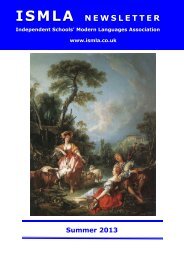Spring 2013 - The Independent Schools' Modern Language ...
Spring 2013 - The Independent Schools' Modern Language ...
Spring 2013 - The Independent Schools' Modern Language ...
You also want an ePaper? Increase the reach of your titles
YUMPU automatically turns print PDFs into web optimized ePapers that Google loves.
Notes from the Editor’s Diary17th November, 2012Keen followers of these pages will recall my excitement that BOTH texts I hadchosen for my A2 students to study were going to be staged in London. <strong>The</strong>first I saw with my pupils was the production of Bérénice by Racine at theDonmar Warehouse, in a translation by Alan Hollinghurst. Perhaps the problemis that my pupils and I actually knew the original French quite well, andmaybe the intimate space of the Donmar does not lend itself to Raciniantragedy, but we came away disappointed. I generally admire Michael Billington’sreviews in the Guardian, but for once I was forced to disagree with himwhen he wrote that ‘the evening, as a whole, is quietly compelling. It certainlybreathes what Racine called "that majestic sadness which is the wholepleasure of tragedy" ‘. For us one of the main barriers to feeling that‘tristesse majestueuse’ was a translation which seemed to deny the majesticin Racine and occasionally slipped into the absurd (since when does onetranslate the French ‘ingrat’ with ‘ingrate’?). Charles Spencer, writing in theDaily Telegraph wrote of the translation ‘Even Alan Hollinghurst …. sometimesstruggles here to make Racine sound fresh and vigorous. His Englishversion of Bérénice is certainly lucid and sometimes elegant, but I neverfound myself ravished by the beauty of the language.’ Lucid, yes, elegant,rarely. Indeed, is it ever possible to render in English the pain and poise ofthese immortal lines?Que le jour recommence, et que le jour finisse,Sans que jamais Titus puisse voir Bérénice,Similarly, one wonders why in British versions or productions of Racine it isalmost de rigueur to want to make the audience laugh on occasions, as if towant to break the unremitting tension between Love and Duty that is at theheart of this French classical tragedy. We want to like and admire Racine butrarely manage to stage his works without (wittingly or unwittingly) injecting adose of the Anglo-Saxon.12th January, <strong>2013</strong>I was invited to take part in a round table discussionat the conclusion of the Annual General Meeting of theSociety for Italian Studies (SIS). I joined Claire Dodd,the Chair of the ALL Italian Committee (who leads athriving Italian Department at Gosforth Academy) andtwo current students from Bristol and Leeds Universitiesto explore take-up of Italian at University and7



